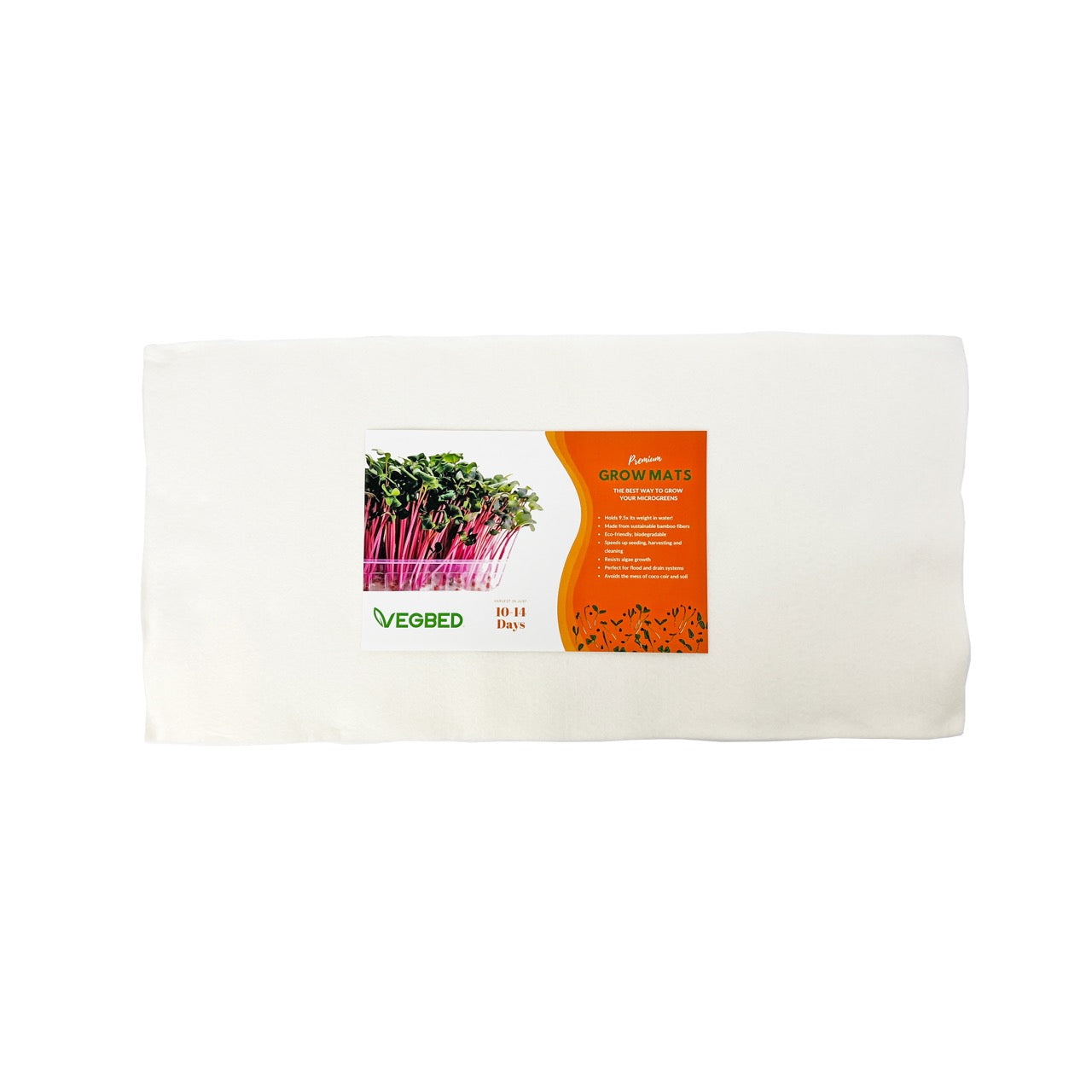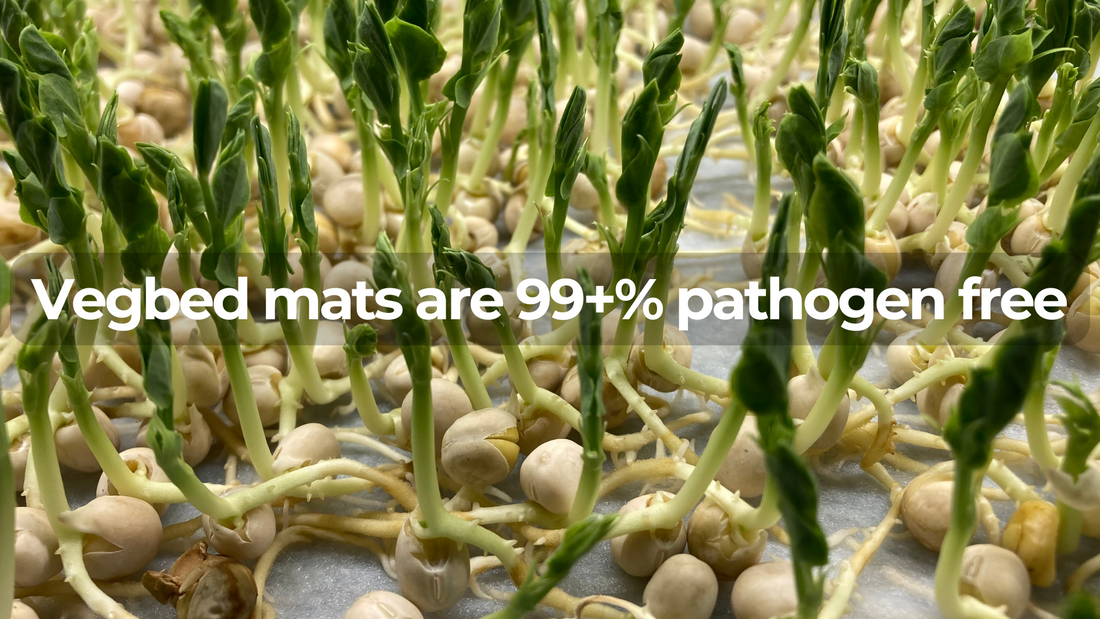Most commercial microgreen farms already follow strict food safety protocols—for good reason. These standards help prevent contamination, ensure customer safety, and maintain trust. However, these practices can sometimes feel out of reach or unnecessary for small growers.
That’s exactly why we created this guide.
At Vegbed, we believe food safety shouldn’t be exclusive to big operations. Whether you're growing for a few customers at a farmer’s market or supplying local chefs, you deserve access to the same knowledge and tools the pros use.
This blog is here to bridge that gap—to help small and home growers meet the same standards that commercial farms follow every day. Because food safety isn’t about scale—it’s about care, responsibility, and pride in your product.
Why Food Safety Matters for Microgreens
Microgreens, unlike sprouts, are grown in light and harvested above the soil line. While this makes them inherently less risky, the nature of the crop—dense growth in humid environments—can still lead to the perfect conditions for bacterial growth if proper hygiene isn’t followed.
Common pathogens like Salmonella, Listeria monocytogenes, and E. coli are the main concerns for leafy greens. And though outbreaks linked specifically to microgreens are rare, small-scale growers are increasingly under scrutiny as consumers demand transparency and safety.
The good news? These risks can be minimized with proper systems, habits, and a bit of education.
Common Sources of Contamination
Foodborne pathogens typically enter the growing system through one of the following routes:
-
Contaminated Seeds – Pathogens can be present on the surface of seeds before planting.
-
Water Quality – Using unfiltered or untreated water can introduce harmful microbes.
-
Growing Medium – Soil or untested media can harbor mold, fungi, or bacteria.
-
Improper Handling – Touching greens with unwashed hands or using unsanitized tools.
-
Storage Issues – Inadequate refrigeration or unclean packaging can encourage bacterial growth post-harvest.
Safe Growing Starts with Clean Inputs
Here’s where many growers unknowingly set themselves up for problems. The safety of your microgreens starts before your seeds even hit the tray.
1. Use Clean Seeds
Always source microgreen-grade seeds from trusted suppliers. Consider treating your seeds with a mild hydrogen peroxide or vinegar soak to reduce the initial microbial load, especially for higher-risk varieties like sunflower or radish.
2. Choose a Safe Growing Medium
This is one of the reasons Vegbed developed our 100% biodegradable bamboo grow mats—to offer a cleaner, inert alternative to soil or other organic media that can harbor mold or bacteria. Bamboo’s natural resistance to microbial growth gives it a distinct advantage in maintaining a clean grow environment.
3. Filter and Monitor Water
If you're using tap water, be sure it’s potable. For best results, use filtered water and store it in sanitized containers. Water quality testing kits are affordable and help keep contamination in check.
Good Hygiene and Sanitation Practices
The physical environment matters too. Here’s what you need to consistently clean and maintain:
-
Trays and Equipment – Sanitize between every grow cycle using food-safe disinfectants like diluted bleach (1:10 ratio) or hydrogen peroxide.
-
Work Surfaces – Clean daily, especially before harvesting or packaging.
-
Hands and Gloves – Always wash hands thoroughly before handling greens, and use disposable gloves when possible.
-
Harvest Tools – Use stainless steel scissors or knives that can be easily disinfected.
-
Airflow and Humidity – Good ventilation and humidity control help prevent mold and fungal growth.
Vegbed’s Pathogen Testing Initiative
At Vegbed, we take food safety seriously. That’s why we’ve recently launched in-house pathogen testing as part of our commitment to helping growers deliver the safest, cleanest microgreens possible.
Our testing screens for major threats such as:
-
Salmonella spp.
-
Listeria monocytogenes
-
Escherichia coli (E. coli)
We analyze our bamboo grow mats regularly to ensure they remain inert and free from harmful microbial activity. Our goal is to set a new standard in microgreens growing media—where sustainability and safety go hand-in-hand.
What this means for you: when you grow with Vegbed, you’re not just choosing an eco-friendly product—you’re choosing peace of mind.
Post-Harvest Safety Tips
Harvesting and packaging are critical points in the food safety chain.
-
Clean Containers – Use sanitized food-safe containers—avoid reusing deli tubs without proper cleaning.
-
Cool Quickly – After harvest, greens should be cooled to below 40°F (4°C) as quickly as possible.
-
Label Clearly – Include harvest dates on containers, and inform customers of “best by” dates (usually 5–7 days refrigerated).
-
Avoid Overhandling – The less the greens are touched, the lower the chance of contamination.
What Regulations Apply to Microgreens?
The FDA Food Safety Modernization Act (FSMA) has specific rules for produce safety that apply to many microgreens growers. Small farms may be exempt from some requirements based on sales and distribution distance—but all should aim to meet these best practices.
It’s good to have a documented food safety plan, even if you’re a solo grower. Include:
-
A list of sanitation practices
-
A record of water testing
-
Traceability methods – So you can identify where your product went and respond quickly if issues arise.
-
Harvest and handling logs – Document who handled the crop and when, to ensure consistency and accountability.
These records not only help you stay organized—they can also be reassuring to customers and food safety inspectors alike.
🌿 Vegbed’s Pathogen Plus Testing
At Vegbed, we don’t just say our products are food-safe—we prove it. As part of our Pathogen Plus initiative, we’ve conducted advanced lab testing on our bamboo fiber grow mats to ensure they meet the highest safety standards in the industry.
Here’s what our latest tests confirmed:
✅ 99% Pathogen Free – Our mats are exceptionally clean, with no significant fungal or eukaryotic presence detected.
✅ Zero Concerning Bacterial Growth – Including E. coli, Salmonella, and Listeria monocytogenes.
✅ Continued Compliance – Previously certified Oeko-Tex 100 and FDA CFR 21 177.1850 compliant.
This makes Vegbed bamboo grow mats not only sustainable and biodegradable—but also one of the cleanest, safest growing mediums on the market.
Because freshness means nothing without safety. And clean growing should always be the standard.
📈 What Commercial Growers Are Doing—And Why You Should, Too
Large-scale microgreen farms are required to follow strict Good Agricultural Practices (GAP) and Hazard Analysis Critical Control Point (HACCP) protocols. These programs outline everything from sanitizing water sources to monitoring critical control points in harvesting and packaging.
Here’s what commercial growers typically do:
-
Use filtered, tested water
-
Sanitize tools, trays, and surfaces between every cycle
-
Implement food-safe, inert growing media
-
Keep detailed records for traceability
-
Train staff in hygiene and safety protocols
While small-scale growers may not face the same regulatory scrutiny, adopting similar practices can offer big benefits:
🌿 Build Trust – Customers feel safer buying from you, especially when you can explain your process.
💼 Expand Opportunities – Many chefs, grocers, and local CSAs prefer to work with growers who demonstrate food safety knowledge.
🚫 Avoid Health Issues – A single case of foodborne illness can damage your reputation and business.
Food safety isn’t a burden—it’s a badge of professionalism. It shows that you care about your product, your customers, and your craft.
🌱 Elevate Your Standards, One Tray at a Time
Food safety isn’t just for large farms with big budgets—it’s for every grower who takes pride in their work and cares about their customers. Even if you're just supplying your local market or a few restaurants, taking a professional approach to safety can protect your business and your reputation.
At Vegbed, we're here to support you with clean, food-grade products and the knowledge to grow safely. Whether you're just starting out or already running a successful small operation, we want to help you raise your standards with every tray you grow.
Final Thoughts
Microgreens may be small, but your responsibility as a grower is huge. The more consumers seek fresh, local greens, the higher the expectations around safety and transparency become.
This guide was written to empower small growers—like you—to operate with the same confidence and professionalism as larger farms. With the right practices in place, and the right products at your side, you can grow a business rooted in both quality and trust.
And with Vegbed's pathogen-tested bamboo grow mats, you’re starting each crop with a cleaner, safer foundation.
Grow smarter. Grow safer. Grow with Vegbed.



